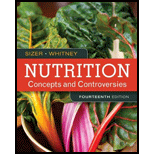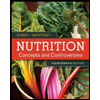
Nutrition: Concepts and Controversies - Standalone book (MindTap Course List)
14th Edition
ISBN: 9781305627994
Author: Frances Sizer, Ellie Whitney
Publisher: Brooks Cole
expand_more
expand_more
format_list_bulleted
Concept explainers
Question
Chapter 4, Problem 16SC
Summary Introduction
To review:
Whether the statement ‘Fruit punch sweetened with grape juice concentrate can contain as much sugar as fruit punch sweetened with high fructose corn syrup’ is true or false.
Concept Introduction:
The fruit punch is referred to liquid syrup made up of fruits. The fructose is the sugar, which is found in the fruits. The sweet taste of the fruit is determined by the amount of the fructose present in it.
Expert Solution & Answer
Want to see the full answer?
Check out a sample textbook solution
Chapter 4 Solutions
Nutrition: Concepts and Controversies - Standalone book (MindTap Course List)
Knowledge Booster
Learn more about
Need a deep-dive on the concept behind this application? Look no further. Learn more about this topic, health-nutrition and related others by exploring similar questions and additional content below.Similar questions
- _______ is (are) a good source of omega-3 fatty acids that can reduce the risk of heart disease. a. Oatmeal b. Legumes c. Fish d. Com syruparrow_forwardThe following chemical reactants produce the ester ethyl ethanoate (C4H8O2): C2H6O + CH3COOH What type of reaction occurs to make ethyl ethanoate? condensation hydrolysis combustion acid-base reactionarrow_forwardUnderstanding an Antidote for Cyanide Poisoning Sodium nitrite (NaNO2) is used by emergency medical personnel as an antidote for cyanide poisoning (for this purpose. it must be administered immediately). Based on the discussion of cyanide poisoning in Section 20.4. Suggest a mechanism for the lifesaving effect of sodium nitrite.arrow_forward
- Lactose is a disaccharide formed by the formation of a bond between glucose and glycosidic; lactose glycosidic; galactose hydrogen; sucrose hydrogen; fructosearrow_forwardEnergetic of Fructose-1 ,6-bis P Hydrolysis (Integrates with Chapter 3.) The standard free energy change (G) for hydrolysis of fructose-1. 6-bisphosphate (FBP) to fructose-S-phosphate (F-6-P) and P: is -16.7 KJ/mol: FBP + H2O fructose-6-P + Pi The standard free energy change (G) for ATP hydrolysis is -30.5 KJ/mol: ATP + H2O ADP + Pj What is the standard free energy change for the phosphofructokinase reaction: ATP + fructose-6-P ADP + FBP b. What is the equilibrium constant for this reaction? c. Assuming the intracellular concentrations of [ATP] and (ADP] are maintained constant at 4 mM and 1.6 mM, respectively, in a rat liver cell, what will be the ratio of [FBP]/[fructose-6-P] when the phosphofructokinase reaction reaches equilibrium?arrow_forwardThe synthetic process by which monomers are covalently linked is (a) hydrolysis (b) isomerization (c) condensation (d) glycosidic linkage (e) ester linkagearrow_forward
arrow_back_ios
arrow_forward_ios
Recommended textbooks for you
 Nutrition: Concepts and Controversies - Standalo...Health & NutritionISBN:9781305627994Author:Frances Sizer, Ellie WhitneyPublisher:Brooks Cole
Nutrition: Concepts and Controversies - Standalo...Health & NutritionISBN:9781305627994Author:Frances Sizer, Ellie WhitneyPublisher:Brooks Cole- Essentials of Pharmacology for Health ProfessionsNursingISBN:9781305441620Author:WOODROWPublisher:Cengage



Nutrition: Concepts and Controversies - Standalo...
Health & Nutrition
ISBN:9781305627994
Author:Frances Sizer, Ellie Whitney
Publisher:Brooks Cole



Essentials of Pharmacology for Health Professions
Nursing
ISBN:9781305441620
Author:WOODROW
Publisher:Cengage